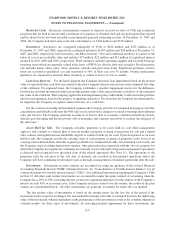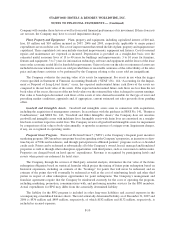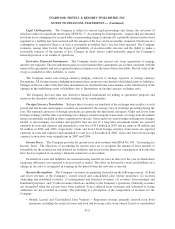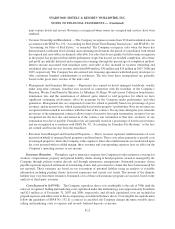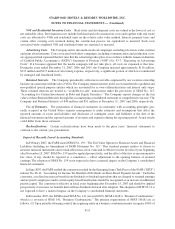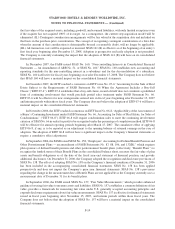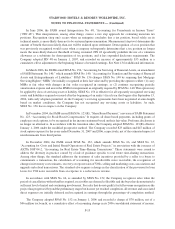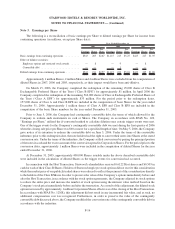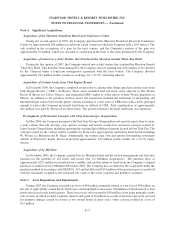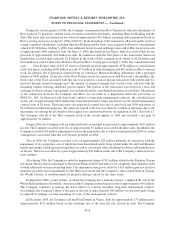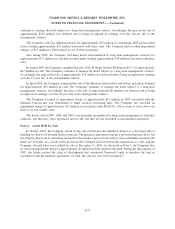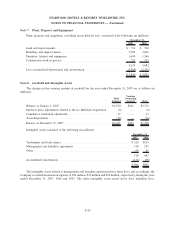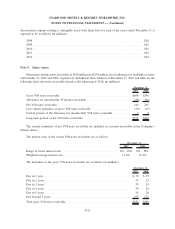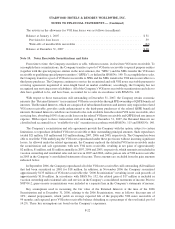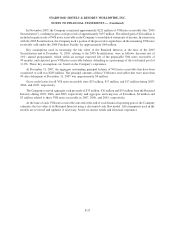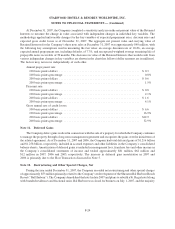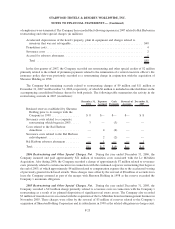Starwood 2007 Annual Report Download - page 135
Download and view the complete annual report
Please find page 135 of the 2007 Starwood annual report below. You can navigate through the pages in the report by either clicking on the pages listed below, or by using the keyword search tool below to find specific information within the annual report.In June 2006, the FASB issued Interpretation No. 48, “Accounting for Uncertainty in Income Taxes”
(“FIN 48”). This interpretation, among other things, creates a two step approach for evaluating uncertain tax
positions. Recognition (step one) occurs when an enterprise concludes that a tax position, based solely on its
technical merits, is more-likely-than-not to be sustained upon examination. Measurement (step two) determines the
amount of benefit that more-likely-than-not will be realized upon settlement. Derecognition of a tax position that
was previously recognized would occur when a company subsequently determines that a tax position no longer
meets the more-likely-than-not threshold of being sustained. FIN 48 specifically prohibits the use of a valuation
allowance as a substitute for derecognition of tax positions, and it has expanded disclosure requirements. The
Company adopted FIN 48 on January 1, 2007, and recorded an increase of approximately $35 million as a
cumulative-effect adjustment to the beginning balance of retained earnings. See Note 13 for additional information.
In March 2006, the FASB issued SFAS No. 156, “Accounting for Servicing of Financial Assets, an amendment
of FASB Statement No. 140,” which amends SFAS No. 140, “Accounting for Transfers and Servicing of Financial
Assets and Extinguishments of Liabilities.” SFAS No. 156 changes SFAS No. 140 by requiring that Mortgage
Servicing Rights (“MSRs”) be initially recognized at their fair value and by providing the option to either: (1) carry
MSRs at fair value with changes in fair value recognized in earnings; or (2) continue recognizing periodic
amortization expense and assess the MSRs for impairment as originally required by SFAS No. 140. This option may
be applied by class of servicing asset or liability. SFAS No. 156 is effective for all separately recognized servicing
assets and liabilities acquired or issued after the beginning of an entity’s fiscal year that begins after September 15,
2006, with early adoption permitted. As the Company’s servicing agreements have been negotiated at arms-length
based on market conditions, the Company has not recognized any servicing assets or liabilities. As such,
SFAS No. 156 has no impact on the Company.
In December 2004, the FASB issued SFAS No. 123(R), “Share Based Payment,” a revision of FASB Statement
No. 123, “Accounting for Stock Based Compensation.” It requires all share-based payments, including grants of
employee stock options, to be recognized in the income statement based on their fair value. Proforma disclosure is
no longer an alternative. In accordance with the transition rules, the Company adopted SFAS No. 123(R) effective
January 1, 2006 under the modified prospective method. The Company recorded $23 million and $47 million of
stock option expense for the years ended December 31, 2007 and 2006, respectively, net of the estimated impact of
reimbursements from third parties.
In December 2004, the FASB issued SFAS No. 152, which amends SFAS No. 66, and SFAS No. 67,
“Accounting for Costs and Initial Rental Operations of Real Estate Projects,” in association with the issuance of
AICPA SOP 04-2, “Accounting for Real Estate Time-Sharing Transactions.” These statements were issued to
address the diversity in practice caused by a lack of guidance specific to real estate time-sharing transactions.
Among other things, the standard addresses the treatment of sales incentives provided by a seller to a buyer to
consummate a transaction, the calculation of accounting for uncollectible notes receivable, the recognition of
changes in inventory cost estimates, recovery or repossession of VOIs, selling and marketing costs, associations and
upgrade and reload transactions. The standard also requires a change in the classification of the provision for loan
losses for VOI notes receivable from an expense to a reduction in revenue.
In accordance with SFAS No. 66, as amended by SFAS No. 152, the Company recognizes sales when the
period of cancellation with refund has expired, receivables are deemed collectible and the buyer has demonstrated a
sufficient level of initial and continuing involvement. For sales that do not qualify for full revenue recognition as the
project has progressed beyond the preliminary stages but has not yet reached completion, all revenue and associated
direct expenses are initially deferred and recognized in earnings through the percentage-of-completion method.
The Company adopted SFAS No. 152 on January 1, 2006 and recorded a charge of $70 million, net of a
$46 million tax benefit, as a cumulative effect of accounting change in its 2006 consolidated statement of income.
F-15
STARWOOD HOTELS & RESORTS WORLDWIDE, INC.
NOTES TO FINANCIAL STATEMENTS — (Continued)






